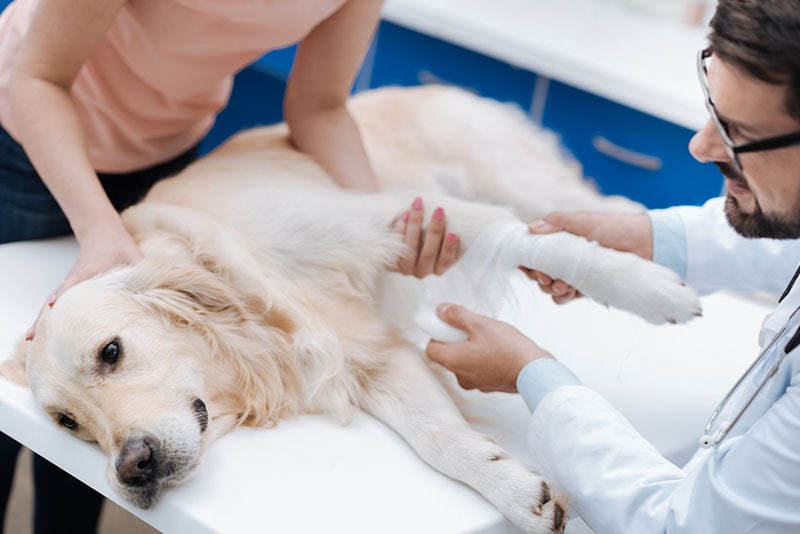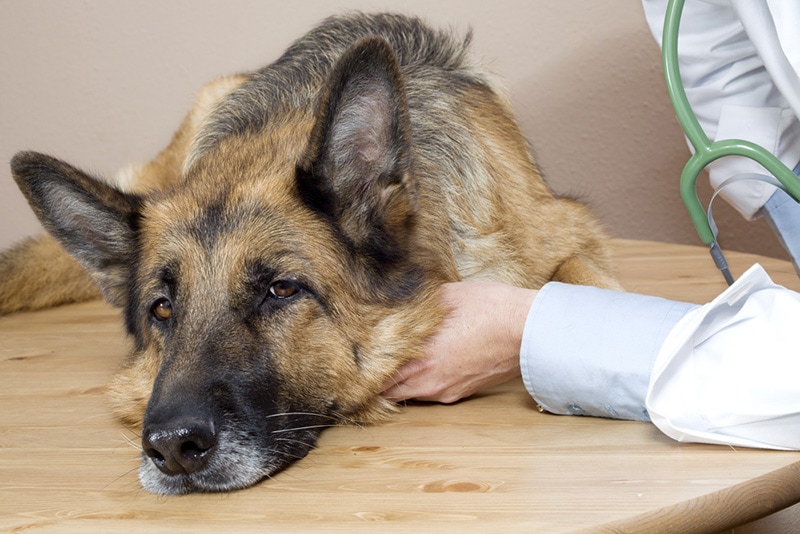If your dog is unsteady on their feet or falling over frequently, it is likely your dog needs veterinary attention. If you see your dog stumbling over or staggering around, this usually means there is a medical issue. This can include things such as traumatic injury, poisoning, infection, or a stroke. You need to take your dog to your vet as soon as possible.
This vet-written guide will teach you the possible causes and treatment options. Read on to find out more.
The 8 Possible Reasons Why Your Dog Is Losing Balance & Falling Over
1. Ear Infection
If your dog is suffering from an ear infection, they may well experience loss of balance. It is usually an inner ear infection that causes them to be unsteady on their feet. The inner ear plays an important role in both hearing and balance. It is housed inside a bony labyrinth in a portion of the temporal bone. The bony labyrinth contains something called the membranous labyrinth, which houses the sensory organs responsible for balance and hearing. Anything that affects this area of the ear will have a profound effect on your dog’s balance.
If an ear infection is present, your dog will likely be scratching their ears, shaking their head, and they also may start walking in circles. In some cases, you will see swelling of the area around the ear or the pinna, discharge, and a foul odor. It can affect one or both ears. If left untreated, ear infections can spread to deeper parts of the skull. They can cause meningitis, which is a serious condition in which the membrane covering the brain and spinal cord (called the meninges) becomes inflamed.
Treatment for ear infections normally involves topical medication applied to the ear canal. This usually contains anti-inflammatories, antifungal medication, and antibiotics. The choice of medication should be guided by culture and sensitivity testing from ear swabs. Sometimes, systemic oral medication is used in conjunction with the topical treatment in severe cases or if your dog won’t tolerate ear drops. In extreme cases, surgery is required.
2. Traumatic Injury
If your dog has experienced an injury, this may affect their balance and their gait. The degree of loss of balance will depend on the location of the injury. For example, if they have injured a leg they may not be able to bear weight on this limb at all, or they may have a limp. Any trauma to the head can cause damage to the inner ear or the brain. This can lead to balance issues.
Some dogs are very good at masking pain so it may be difficult to identify at first unless you witnessed the trauma incident.
If your dog is in pain, they will usually be restless, start panting, have a reduced appetite, they may vocalize more often, they can have slower reflexes, and try to itch or bite around the wounded area. They may seem more anxious than usual. Treatment will depend on the location and the nature of the injury. Some brain and soft tissue injuries will gradually resolve with time; some require pain medication, and others require surgical correction.

3. Ataxia
Ataxia is the name for a neurological disorder that affects your dog’s coordination and balance. It is usually characterized by a staggering, wobbly gait. Causes of ataxia are either from damage to the spinal cord, the vestibular system, or the cerebellum. Vestibular ataxia results from a problem with the vestibular system. The vestibular system maintains your dog’s balance. It is split into two important parts: the peripheral portion, made up of the inner and middle ear, and the central portion, which is in the brain.
If the cerebellum is damaged, cerebellar ataxia occurs. If the spinal cord becomes compressed (often due to a tumor or dislodged intervertebral disk), sensory ataxia is witnessed.
As well as alterations in gait, some dogs experience something called nystagmus which is when their eyes flicker from side to side. They can also get a head tilt, start walking in circles, and may vomit. Treatment includes supportive care such as intravenous fluid therapy, pain medication, and ensuring your dog’s environment is safe to prevent injuries while your dog is unstable.
4. Brain Tumor
Brain tumors are usually seen in older dogs, but puppies can still be affected occasionally. The signs witnessed largely depend on the location and size of the tumor. Dogs are often unstable on their feet and walk in circles. Other signs, determined by the location, include behavioral changes, seizures, head tilt, tremors, nystagmus (flickering eye movements), and changes in appetite.
Treatment is determined by the type and location of the tumor. Three options are available: neurosurgery, carried out by a specialist at a referral hospital; chemotherapy drugs, which aim to reduce the tumor and alleviate clinical signs; and radiation therapy, which is used to reduce or attempt to eliminate the tumor and can be used in conjunction with other treatments, such as surgery.

5. Stroke
A stroke is not a particularly common occurrence in dogs, but it does happen. A stroke occurs when the blood flow to the brain is suddenly interrupted. Usually, a stroke is the result of a blood clot, abnormally high blood pressure, head injury, hemorrhage, kidney disease, or migrating parasites. Signs your dog is experiencing a stroke include head tilt, incoordination, walking in circles, loss of control of bladder and bowels, issues with vision, and weakness or collapse.
There is no specific treatment for a stroke in dogs, and usually not much that can be done to reverse any brain damage that has occurred. Your vet will usually focus on finding out the underlying cause and treating that, if possible, to prevent the event from occurring again.
6. Encephalitis
Encephalitis (inflammation of the brain) often causes dogs to lose their balance and fall over. Inflammation of the brain can be caused by bacterial infections, parasites including ticks, and fungal infections. If your dog has encephalitis, they may also have a systemic fever and reduced appetite. Treatment is carried out depending on the underlying cause. Antibiotics, anti-parasite medication, antifungal medication, and steroids can all be used if deemed necessary.

7. Syncope
Syncope (fainting) episodes are common in dogs and can cause loss of balance and falling over. Fainting occurs when your dog’s brain is deprived of oxygen or glucose. Most episodes of fainting only last a brief amount of time. Fainting is not an actual disease; however, it is a symptom of a different issue that can be caused by multiple things. Causes of fainting include heart problems, seizures, and abnormal brain activity. Make sure you do not confuse collapse with fainting.
Loss of consciousness does not normally occur with collapse episodes, but it does with fainting. As fainting is a symptom rather than a disease process, there is no treatment, however, if an underlying cause is identified then this can be addressed accordingly.
8. Seizures
Seizure activity is a frightening and common problem in dogs. There are multiple causes, and often, the seizure is the result of an underlying disease. Signs of a seizure include violent shaking and falling over, loss of balance and tremors, stiff limbs, and muscle spasms. Some dogs lose consciousness when experiencing a seizure.
The causes of seizures in dogs can be categorized into extracranial and intracranial. Extracranial causes mean the cause is somewhere outside of the brain but still affects the brain enough to cause seizure activity. These include hyperthermia, liver problems, poison ingestion, hypoglycemia, hypocalcemia, and hypothyroidism.
Intracranial causes refer to causes that cause functional or structural changes inside the dog’s brain. These include epilepsy, traumatic injury, tumors, autoimmune disease, infections, and nutritional imbalance. Treatment can involve ridding the body of toxins, correcting any physiological, metabolic, or nutritional disturbances, correcting endocrine issues, and antibiotic or anticonvulsant medication such as phenobarbital or potassium bromide.

If you are seeking the best possible treatment for your pup, we recommend speaking with a vet.
PangoVet. It’s an online service where you can <b>talk to a vet online</b> and get the personalized advice you need for your pet — all at an affordable price!
</p>
<div class="su-button-center"><a href=https://www.dogster.com/ask-the-vet/"https://pangovet.com/?utm_source=dogster&utm_medium=article&utm_campaign=dog_preventative_wellness%22 class="su-button su-button-style-default" style="color:#FFFFFF;background-color:#FF6600;border-color:#cc5200;border-radius:9px;-moz-border-radius:9px;-webkit-border-radius:9px" target="_blank" rel="nofollow"><span style="color:#FFFFFF;padding:0px 24px;font-size:18px;line-height:36px;border-color:#ff944d;border-radius:9px;-moz-border-radius:9px;-webkit-border-radius:9px;text-shadow:none;-moz-text-shadow:none;-webkit-text-shadow:none"> Click to Speak With a Vet</span></a></div></div></div>"}" data-sheets-userformat="{"2":4224,"10":2,"15":"Arial"}" data-sheets-validation-definition="{"1":{"1":{"1":23,"2":[{"1":1,"3":{"1":{"1":[{"1":4,"6":1},{"1":1,"2":"="}]},"2":{"1":[{"1":2,"2":"="},{"1":3,"3":1}]},"3":"R1]S"},"4":[{"1":{"1":1,"2":21,"3":0,"4":1,"5":2236944,"6":"841046713"},"2":1}]}],"6":[{"1":{"2":{"1":2,"2":"❤️ Preventative wellness"}},"2":{"1":2,"2":676776},"3":{"1":2,"2":12574966}},{"1":{"2":{"1":2,"2":"⚠️ Urinary problems"}},"2":{"1":2,"2":676776},"3":{"1":2,"2":12574966}},{"1":{"2":{"1":2,"2":"🩺 Other"}},"2":{"1":2,"2":676776},"3":{"1":2,"2":12574966}},{"1":{"2":{"1":2,"2":"👁️ Eye issues"}},"2":{"1":2,"2":676776},"3":{"1":2,"2":12574966}},{"1":{"2":{"1":2,"2":"🐕 Behavior & training"}},"2":{"1":2,"2":676776},"3":{"1":2,"2":12574966}},{"1":{"2":{"1":2,"2":"🤮 Vomiting"}},"2":{"1":2,"2":676776},"3":{"1":2,"2":12574966}},{"1":{"2":{"1":2,"2":"🛡️ Flea & tick"}},"2":{"1":2,"2":676776},"3":{"1":2,"2":12574966}},{"1":{"2":{"1":2,"2":"🍎 Ate or drank"}},"2":{"1":2,"2":676776},"3":{"1":2,"2":12574966}}]},"2":{"1":{"1":[{"1":4,"6":0},{"1":4,"6":1},{"1":2,"3":"CONDITION_ONE_OF_RANGE","4":2},{"1":1,"2":"="}]},"3":"R0]R1]FCONDITION_ONE_OF_RANGE:2]S"},"3":[{"1":{"1":0,"2":1,"3":0,"4":1,"5":1118464},"2":0},{"1":{"1":1,"2":21,"3":0,"4":1,"5":2236944,"6":"841046713"},"2":1}]},"2":"","3":1,"4":1,"6":0}" data-sheets-validation-id="0"> If you need to speak with a vet but can’t get to one, head over to PangoVet. It’s an online service where you can talk to a vet online and get the personalized advice you need for your pet — all at an affordable price!

Final Thoughts
If you notice your dog has suddenly lost their sense of balance or they start falling over, they are likely to be suffering from a serious health issue that needs immediate attention from your vet. Due to there being so many causes, treatment, prognosis, and possible recovery do vary greatly. You can ensure no further injuries arise by making your dog’s environment safe while they are unbalanced and falling over.
Luckily, lots of the causes for these problems are easily curable. Ensure you follow any instructions your vet has given you and stick to the treatment plan. If you do this, you will hopefully see an improvement in your dog’s balance and coordination.
- See also: Why Is My Dog Collapsing?
Featured Image Credit: EugeneEdge, Shutterstock












